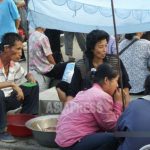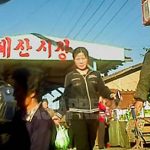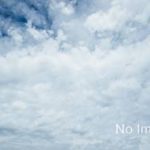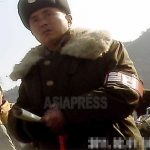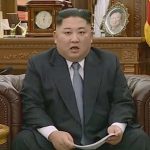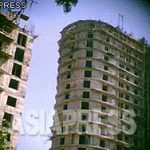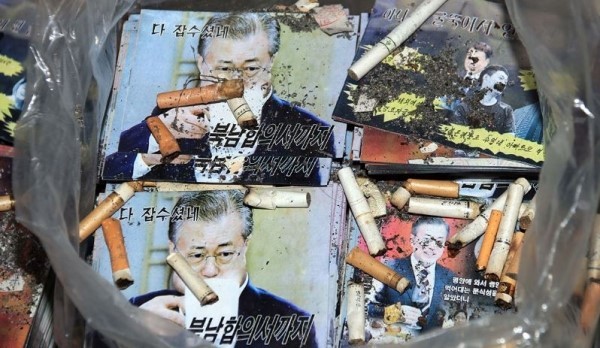
◆ Law stipulates the death penalty as the maximum punishment
The Kim Jong-un regime enacted the “Pyongyang Cultural Language Protection Act” in January of this year. In April, the regime began a campaign to crackdown on language impurities at companies and social organizations. The campaign is aimed at ensure no one uses South Korean style speech, foreign loan words, Japanese loan words, and dialects, and people who violate the law are being reported to the police and investigated. The maximum punishment stipulated by the new law is the death penalty. ASIAPRESS heard about the situation on the ground from a reporting partner in the northern part of the country. (ISHIMARU Jiro / KANG Ji-won)
◆ New law bans use of “oppa” and “nim”
The text of the Pyongyang Cultural Language Protection Act is astonishing. The law is full of statements calling South Korea a puppet. Daily NK, a North Korea-focused outlet based in South Korea, acquired the full text of the law in March. Here, we present several of the articles of the law.
※ Translations of the law will be published through a three-part series.
Article18. Basic Requirements for Exterminating the Remnants of the Puppet Language
The extermination of the remnants of the puppet language is a critical requirement to better adhere to our socialist system and our people’s spiritual and cultural life and more firmly establish the revolutionary and class strong holds. With a clear concept of hostility, institutions, enterprises, organizations and citizens shall mercilessly eliminate the remnants of the puppet language that has infiltrated our language domain through a nationwide struggle.
Article 19. Ban on Imitating Puppet Style Titles
Citizens shall not imitate the use of titles in the puppet style,such as young people calling non-relatives “Oppa” or adding “Nim”at the end of their time in the Korean Children’s Union, but starting from their time in the Socialist Patriotic Youth League, they must use the titles “Dongji” and “Dongmu.
“Oppa” refers to a term commonly used by South Korean girls and women to call their older brothers or boyfriends. Even in South Korean dramas, women frequently call their older boyfriends oppa. “Nim” is a particle attached to names and titles in South Korea to show respect toward others.
All students from the second year of elementary school to the third year of middle school join the Korean Children’s Union. Starting from the first year of high school, students join the Socialist Patriotic Youth League. The law stipulates that it’s ok for children to say these words, but when they become part of the youth league, they are required to say “comrade.” (North Korea’s compulsory education system is 12 years, including one year in kindergarten, five years in elementary school, three years in middle school, and three years in high school)
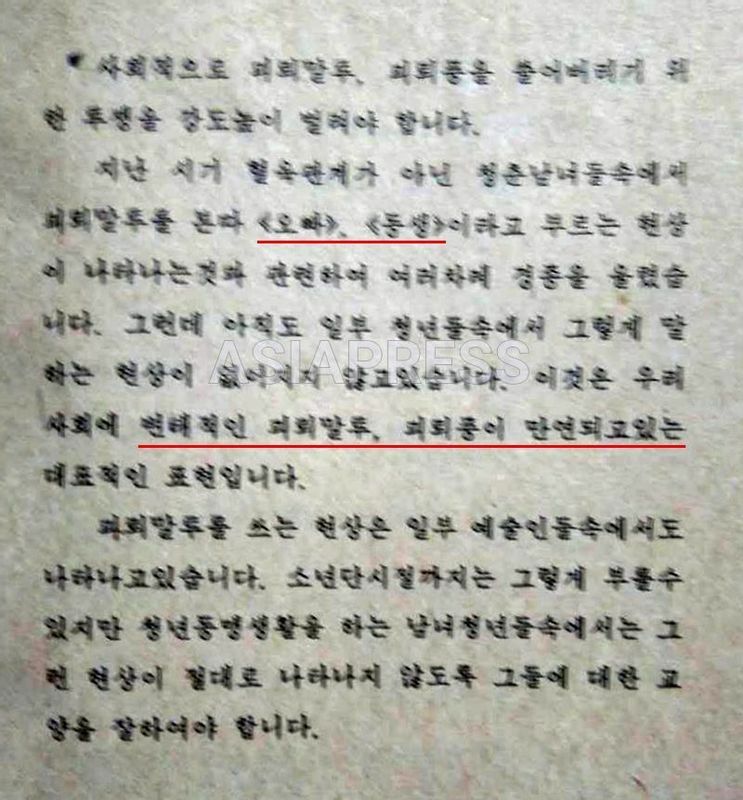
◆ Ban on people giving their children South Korean style names
The law even slaps bans on specific uses of South Korean style speech.
Article 20. Ban on Imitating Expressions in the Puppet Style
Citizens shall not imitate puppet style expressions in their linguistic lives.
Article 21. Ban on the Use of the Puppet Writing Style and Grammar
Citizens shall not write text or create documents using the writing style or grammar of the puppet language.
Article 22. Ban on the Imitation of Puppet Style Intonation.
Citizens shall not imitate puppet style intonation by raising and lengthening their intonation at the end of a phrase in an obsequious, lilting and nauseating way.
※ Cell phones are referred to as “hand phones” in North Korea, while “computer networks” refers to the country’s Intranet.
◆Investigating the use of South Korean style speech
Starting in late April, ASIAPRESS inquired about the authorities’ efforts to crackdown on certain kinds of speech to reporting partners in North Hamgyung Province and Yanggang Province. In this installment, we provide information gleaned from a reporting partner in Yanggang Province who is a housewife also involved in a wide range of business activities.
―― Are the crackdowns on speech conducted in an organized fashion?
The Socialist Women’s Union of Korea, companies and organizations are being ordered to crackdown on the use of South Korean speech, loan words, and Japanese words. People report on others, and everyone is being instructed to stop using dialects, foreign loanwords, and South Korean speech. If someone is accused of using South Korean speech, they face an investigation into where/from whom they learned the speech.
―― Can you give us a specific example of how the crackdowns are taking place?
The authorities are demanding that people use the words for comrade (dongji, dongmu). They are threatening that using the particle nim will be investigated, so everyone is being careful about what they say. They are also emphasizing that cadres need to do careful preparations for speeches they make.
Even kids are being careful about using the word oppa to call their own older brothers; that’s how serious the crackdown is. They are watching each other to figure out what to call each other. There’s a lot of people who have been taken away by the police after being reported for using South Korean style speech.
◆ Even Japanese and other foreign loan words are banned
People are even being told to fix the language they use for tools at factories. “Penchi” (pinchers) have to be called “chipgae,” while “doraiba” (screw drivers) have to be called “nasapulgae” (literally tool to loosen screws). Other words such as “geuruma” (wheelbarrow) and “daesakeu” (backpack) are also banned. Officials have put together lists of all the improper words used in the workplace to memorize during morning reading periods and education periods so they are not used ever again.
One work unit leader used a foreign loanword while handing down a task to his work unit and faced a struggle session. The Youth League doesn’t allow people to go home until they memorize the Pyongyang Cultural Language words after work.
The party committee has called for the crackdown on speech to continue to the very end given it is based on instructions from the Workers’ Party, and that the struggle must continue until all the South Korean style speech and foreign loanwords remaining in society have been eliminated.
―― What is the response shown by people to all of this?
For us, many people think that all the words are all the same. Young people like using new words, so the authorities can just crackdown on them. People are unhappy about why the authorities are pushing to correct the speech of even old people whose way of speaking has been entrenched.
North Korea’s crackdown on improper forms of speech did not start this year; crackdowns began from January 2020 on orders from Kim Jong-un. The authorities have called for a stop to the increasing tendency to give children South Korean style names, calling them “rashly created names” and ordering for kids with these names to obtain new names. However, many people are upset about this, questioning why the authorities are getting involved in how people name their own children. (to be continued in the next installment)
※ ASIAPRESS communicates with reporting partners through Chinese cell phones smuggled into North Korea.
- <Investigation> The authorities start crackdowns based on the Pyongyang Cultural Language Protection Act (1)… “Eliminate South Korean speech, dialects, and loanwords”… The maximum punishment is execution
- <Investigation>Increase in wandering homeless people throughout North Korea…poverty-stricken elderly people and children forced out into the streets, with some even dying…The authorities order thorough measures to be taken
- <Interview with N. Korean> Farm mobilizations start early this year amid orders to mobilize “every able-bodied person,” How about the situation on the ground
- <Inside N. Korea>The authorities strengthen punishments toward those engaging in the “non-socialist” practice of living together outside of marriage, even dragging violators in front of public trials and punishing them with forced labor
- <Inside N. Korea> “Just one piece of laundry soap and a couple kilograms of corn…” ASIAPRESS asks N. Koreans about the special rations for Kim Il Sung’s birthday
